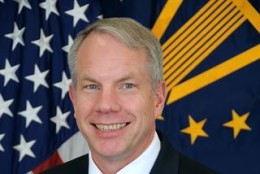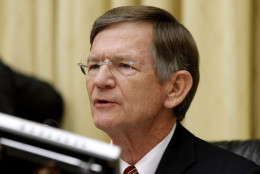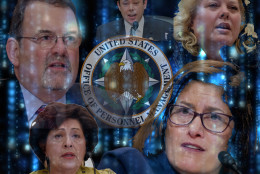OPM Cyber Breach
-
The National Security Agency's approach to 21st century threats comes with six new directives and a new look for part of its two-pronged mission.
August 16, 2016 -
The Defense Department says it's seeing a noticeable cybersecurity culture change from its service commanders. Under DoD's Cybersecurity Implementation Discipline Plan, service leaders meet weekly with the department's CIO to discuss their performance on 10 basic cyber measures.
August 11, 2016 -
Dave DeVries, currently DoD’s principal deputy CIO, will help OPM transition to the new National Background Investigation Bureau.
August 09, 2016 -
House Science, Space and Technology Committee Chairman Lamar Smith (R-Texas) wrote letters to both the Office of Personnel Management and Office of Management and Budget about their agencies' responses to a series of cyber breaches within the past year. Specifically, Lamar questioned whether foreign nationals and contractors had access to major IT systems and role they play in securing them.
July 19, 2016 -
A new Office of Federal Procurement Policy memo and proposed rule by the FAR Council are part of the administration’s ongoing efforts to change the way agencies buy products and services.
July 11, 2016 -
NSA Director of Information Assurance Curtis Dukes thinks identity theft was the reason for the OPM hacks. But regardless of their purpose, he says the breaches highlight a need for both industry and agencies to get up to speed to defend against smarter and more sophisticated enemies.
June 30, 2016 -
DHS leaders say the public and private sector now more than ever need to work together to protect the country's critical infrastructure and cyber systems.
June 21, 2016 -
Federal contractors say there is room for improvement when it comes to protecting itself and working with government in a post-OPM breach environment. That includes modernizing the bidding process, sharing more information and being ready to adapt to an ever-changing threat.
June 08, 2016 -
An exclusive Federal News Radio survey found that about 45 percent of public and private sector employees disagreed with the notion that their office or agency was better prepared to protect against future data breaches. Only about 25 percent of respondents said they were confident their workplace understood cyber risks.
June 07, 2016 -
The Office of Personnel Management experienced some of the biggest changes in the year since hackers stole the data of 22 million current and former federal employees. The cyber attack helped put in motion some of the biggest cybersecurity improvements in the last decade.
June 07, 2016 -
The Office of Personnel Management posted a job announcement June 1 for a new chief information officer.
June 01, 2016 -
A third report in a year suggests OPM continues to struggle to develop a credible business case and now will have trouble paying for the network and security upgrades.
May 26, 2016 -
The Office of Personnel Management's cybersecurity breach stands as a kind of watershed. But results from a survey by ISC(2) and KPMG show the lessons may not have penetrated the ranks of federal security chiefs. Dan Waddell, managing director for North America with ISC(2) and Tony Hubbard, a principal with KPMG, share more on Federal Drive with Tom Temin.
May 20, 2016 -
In the 12 months since the OPM cyber breach, is the government and industry in a better position when it comes to cybersecurity? Take our anonymous survey.
May 20, 2016 -
The Navy said it wants to look outside the box for new solutions to its challenges with cybersecurity and embedded platform systems. Navy Deputy CIO Janice Haith said the service will launch a contest later this month to solicit ideas from its own workforce on getting rid of or modernizing outdated, tactical systems.
May 19, 2016















